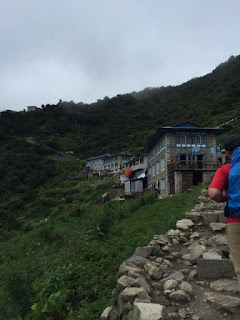Day 3: The Ascent to Namche
While it may have been the middle of a heat wave in
Northeast, we woke up to 30-40 degree damp weather. In Nepal it is monsoon
season so it is both cold and wet for a majority of the day. Luckily, most of
the rain occurs between 5pm-5am so we are able to avoid most of it by trekking
between 9am and 4pm. As it would turn out, we rarely got rained on besides short
lived drizzles. Although we did not see much rain while hiking, we did see an
abundance of clouds. Clouds cling to the mountains, flowing through the valleys
like weightless rivers defying gravity as they wash up and down mountain sides.
For the entirety of the trip to Thame we never saw above the top 2/3 of a
mountain. Instead we saw waterfalls that seemingly fell from the sky, rivers
without beginning or end, and endless vegetation so green and new it seemed a
mirage.
Most of the day was spent hugging the river as we headed north
to Namche, until two hours before our expected arrival. As we stopped for a
quick break to allow those who were further behind the group to catch up, one
of our guides Mingma pointed up to a bridge some 500 feet above connecting one
mountain to the next. He told us that we were headed up to the bridge on our
way to Namche. And so the ascent began.

The ascent that followed was the most difficult hike I have ever had. For two straight hours we climbed up nearly 1,000 meters of steep mountainside. Never have I felt so out of shape. By the halfway point, every breath was a struggle and I was sweating more than I knew possible.
Seeing the first house was euphoric. Passing the house, we
turned a corner and saw the most incredible city that I can only compare to the
mythical El Dorado. Hidden near in a cove carved into the side of a mountain,
Namche is a collection of hundreds of houses, lodges, shops, and restaurants.
On the upper west side of the city was the Namche monastery, the upper east a
school and even higher up, the first view point of Mount Everest overlooked by a statue of Tenzin Norgay.

We walked through a stupa, over a beautifully carved stoned
bridge crossing a river outlined by multi-colored tiles cutting through the
east side of the city. After climbing some more stairs, we reached our lodge.
Finally able to drop our bags we sat down in the lodge’s restaurant that
overlooked lower Namche and further out a spectacular view of the neighboring
mountain slowly revealed by parting clouds.
That night, I had one of the best dinners of my life. I do
not know if it tasted particularly amazing in anyway, but that meal was
incredible after our grueling day.
Day 4: Rest, an Everest Attempt, and Shopping
Since a few members of our team needed more time adjusting
to the altitude, we decided to spend a full day in Namche to get acclimated to
the change in oxygen. This of course meant climbing hundreds of stairs to get
around Namche. We traveled to the Namche Bazaar market, but it was closing up.
Late to that party we moved on to the Sagarmatha National Park Museum where the
first view of Everest, if not cloudy, is located. Unfortunately, it was a very
cloudy day and we could see no further than 200 feet never mind the summit of
the world’s tallest mountain.
After visiting the National Park’s Museum we went to the
Sherpa Museum where a traditional Sherpa house is on exhibit along with a photo
gallery filled with Sherpa history. Their houses are very small, have only two
to three rooms depending on Sherpa’s wealth and is filled with copper and
bronze kitchenware.
Wrapping up our day we went shopping and visited the Namche
monastery. At first we found convenience/souvenir stores, but on our third try
we found a shop filled with beautiful art, relics, Buddhist symbols, and jewelry.
The monastery meant another climb up the other side of Namche. When we got
there I was very surprised because of how many people were there. In a fairly
small room were about 30 monks and a few hundred worshippers seeking a blessing
from the Namche Lama. Since there were so many people we did not get a
blessing, although, part of our group went back later that night and received
one when the crowd died down.
The journey to be
continued in The Nepali Chronicles: Thame
























